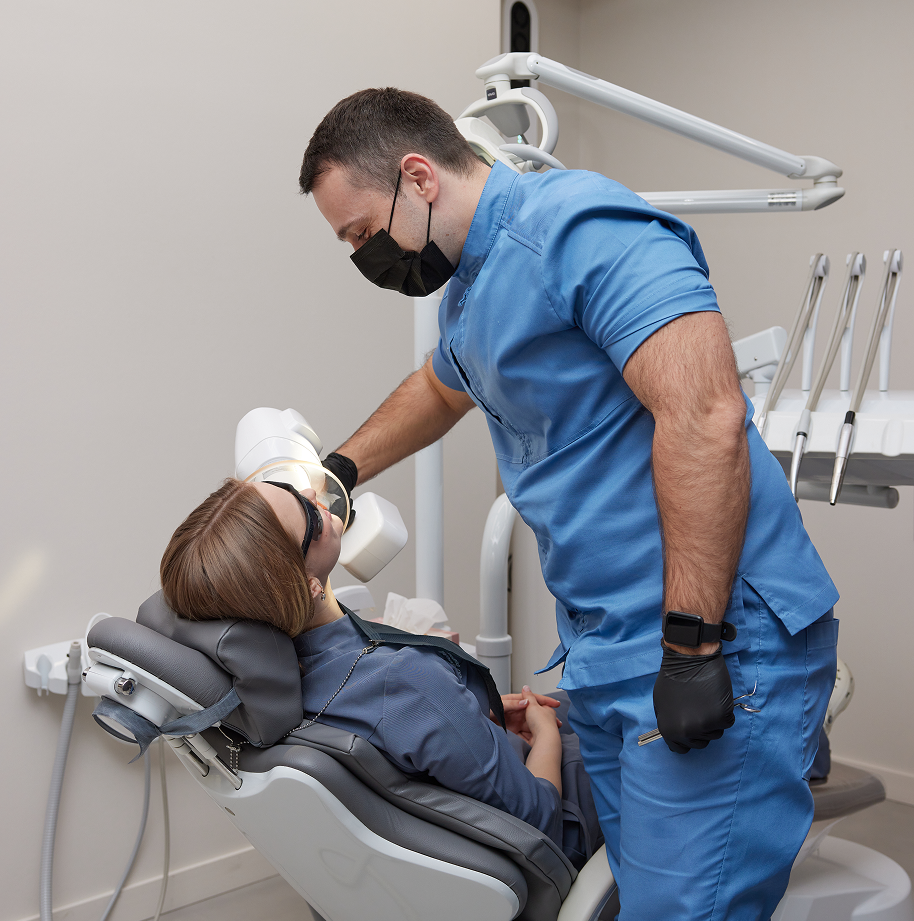Why do teeth darken? How can you whiten your teeth? These questions concern many people because teeth are not only an important part of a smile but also an indicator of health. If you notice that one or more of your teeth have started to darken, it can be worrying. However, tooth discoloration does not always indicate a serious problem. In this article, we will discuss why teeth darken, what to do in such situations, and how to whiten your teeth at home or in a clinic.
Why Do Teeth Have Different Colors?
The color of a tooth depends on its structure. A tooth consists of two main layers:
- Enamel – the outermost, hardest, and semi-transparent layer.
- Dentin – the inner layer that determines the tooth's primary color.
The thinner and more transparent the enamel, the more visible the dentin's color becomes. If the dentin is rich in color, the teeth may appear darker or yellower. Conversely, thick and less transparent enamel makes teeth look lighter.

Why Can a Tooth Darken? Causes of Tooth Discoloration
- Cavities (Tooth Decay)
- Treating cavities is essential for maintaining healthy teeth. Bacteria destroy the enamel, causing the tooth to change color, turning yellow, brown, or even black. If left untreated, cavities can lead to pulpitis or other complications.
- Tooth Injury
- A blow or injury can damage the blood vessels inside the tooth. Due to internal bleeding, the tooth may darken. In such cases, a visit to the dentist is necessary.
- Old Fillings and Materials
- Fillings containing silver or other outdated materials may give the tooth a grayish tint over time. Replacing old fillings can help restore the tooth's natural color.
- Smoking and Staining Foods
- Why do teeth turn yellow? Smoking and frequent consumption of coffee, tea, red wine, or foods with strong pigments (such as berries) can lead to plaque buildup and discoloration. Professional dental cleaning can help remove these stains.
- Medications and Health Conditions
- Some medications (such as tetracycline antibiotics) or health conditions (such as fluorosis or metabolic disorders) can cause tooth discoloration.
- Age-Related Changes
- How can you maintain white teeth? Over time, enamel wears down, making the darker dentin more noticeable. Regular care and dental visits help preserve tooth whiteness.
When Should You See a Dentist?
If a tooth suddenly darkens without an obvious cause or is accompanied by pain, swelling, or a bad smell, it may indicate a serious issue (such as pulp necrosis or infection). In this case, schedule a dental appointment as soon as possible.

How to Prevent Tooth Discoloration? Prevention Tips
- Brush your teeth twice a day.
- Use dental floss, an oral irrigator, and mouthwash.
- Monitor oral hygiene using plaque indicators.
- Limit consumption of staining foods and quit smoking.
- Visit the dentist every six months for check-ups and professional cleanings.
Treatment for a Darkened Tooth
If a tooth has already darkened, do not delay a visit to the dentist. Depending on the cause, the dentist may suggest:
- Cavity or pulpitis treatment.
- Replacement of old fillings.
- Professional teeth whitening or tooth restoration.
- Professional cleaning to remove plaque and tartar.
How to Whiten Your Teeth? Teeth Whitening Methods
- At-home whitening using special toothpaste and trays.
- Professional whitening in a clinic (laser, photo-whitening, or chemical whitening).
- Aesthetic restoration with veneers or lumineers.
Where Can You Whiten Your Teeth?
At Dr. Budovsky's Clinic, we care about your smile! Our specialists will conduct diagnostics, offer effective dental treatment, and help you maintain white and healthy teeth. Book a consultation today!
Why Choose Us?
- Modern equipment and materials.
- Experienced doctors with a personalized approach.
- Comprehensive treatment and prevention.
Don't postpone your dental health—trust the professionals!
Dentist-Therapist A.A. Neronov
Budovsky Clinic in St. Petersburg



